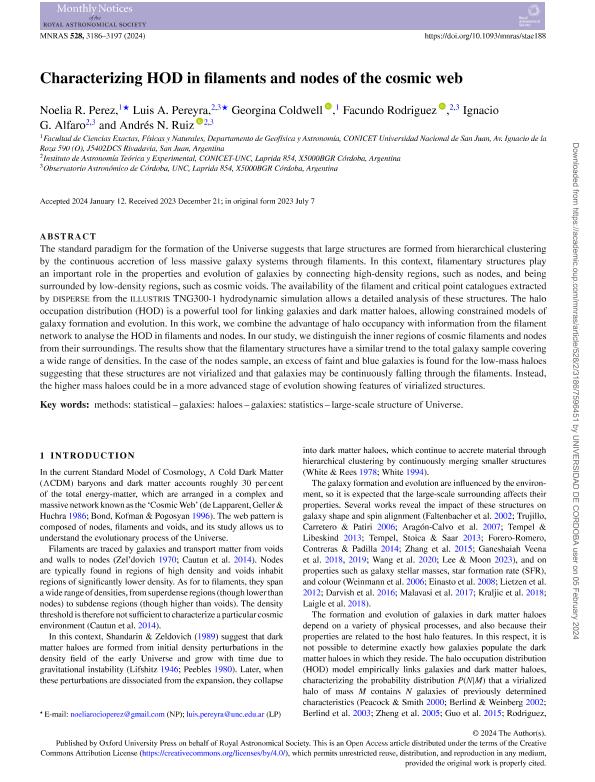Mostrar el registro sencillo del ítem
dc.contributor.author
Perez, Noelia Rocío

dc.contributor.author
Pereyra, Luis Alberto

dc.contributor.author
Coldwell Lloveras, Georgina Vanesa

dc.contributor.author
Rodriguez, Facundo

dc.contributor.author
Alfaro, Ignacio Germán

dc.contributor.author
Ruiz, Andrés Nicolás

dc.date.available
2024-03-27T12:21:38Z
dc.date.issued
2024-02
dc.identifier.citation
Perez, Noelia Rocío; Pereyra, Luis Alberto; Coldwell Lloveras, Georgina Vanesa; Rodriguez, Facundo; Alfaro, Ignacio Germán; et al.; Characterizing HOD in filaments and nodes of the cosmic web; Wiley Blackwell Publishing, Inc; Monthly Notices of the Royal Astronomical Society; 528; 2; 2-2024; 3186-3197
dc.identifier.issn
0035-8711
dc.identifier.uri
http://hdl.handle.net/11336/231667
dc.description.abstract
The standard paradigm for the formation of the Universe suggests that large structures are formed from hierarchical clustering by the continuous accretion of less massive galaxy systems through filaments. In this context, filamentary structures play an important role in the properties and evolution of galaxies by connecting high-density regions, such as nodes, and being surrounded by low-density regions, such as cosmic voids. The availability of the filament and critical point catalogues extracted by DISPERSE from the ILLUSTRIS TNG300-1 hydrodynamic simulation allows a detailed analysis of these structures. The halo occupation distribution (HOD) is a powerful tool for linking galaxies and dark matter haloes, allowing constrained models of galaxy formation and evolution. In this work, we combine the advantage of halo occupancy with information from the filament network to analyse the HOD in filaments and nodes. In our study, we distinguish the inner regions of cosmic filaments and nodes from their surroundings. The results show that the filamentary structures have a similar trend to the total galaxy sample covering a wide range of densities. In the case of the nodes sample, an excess of faint and blue galaxies is found for the low-mass haloes suggesting that these structures are not virialized and that galaxies may be continuously falling through the filaments. Instead, the higher mass haloes could be in a more advanced stage of evolution showing features of virialized structures.
dc.format
application/pdf
dc.language.iso
eng
dc.publisher
Wiley Blackwell Publishing, Inc

dc.rights
info:eu-repo/semantics/openAccess
dc.rights.uri
https://creativecommons.org/licenses/by-nc-sa/2.5/ar/
dc.subject
methods: statistical
dc.subject
galaxies: haloes
dc.subject
galaxies: statistics
dc.subject
large-scale structure of Universe
dc.subject.classification
Otras Ciencias Naturales y Exactas

dc.subject.classification
Otras Ciencias Naturales y Exactas

dc.subject.classification
CIENCIAS NATURALES Y EXACTAS

dc.title
Characterizing HOD in filaments and nodes of the cosmic web
dc.type
info:eu-repo/semantics/article
dc.type
info:ar-repo/semantics/artículo
dc.type
info:eu-repo/semantics/publishedVersion
dc.date.updated
2024-03-19T14:13:28Z
dc.journal.volume
528
dc.journal.number
2
dc.journal.pagination
3186-3197
dc.journal.pais
Estados Unidos

dc.description.fil
Fil: Perez, Noelia Rocío. Universidad Nacional de San Juan. Facultad de Ciencias Exactas, Físicas y Naturales. Departamento de Geofísica y Astronomía; Argentina. Consejo Nacional de Investigaciones Científicas y Técnicas. Centro Científico Tecnológico Conicet - San Juan; Argentina
dc.description.fil
Fil: Pereyra, Luis Alberto. Consejo Nacional de Investigaciones Científicas y Técnicas. Centro Científico Tecnológico Conicet - Córdoba. Instituto de Astronomía Teórica y Experimental. Universidad Nacional de Córdoba. Observatorio Astronómico de Córdoba. Instituto de Astronomía Teórica y Experimental; Argentina
dc.description.fil
Fil: Coldwell Lloveras, Georgina Vanesa. Consejo Nacional de Investigaciones Científicas y Técnicas. Centro Científico Tecnológico Conicet - San Juan; Argentina. Universidad Nacional de San Juan. Facultad de Ciencias Exactas, Físicas y Naturales. Departamento de Geofísica y Astronomía; Argentina
dc.description.fil
Fil: Rodriguez, Facundo. Consejo Nacional de Investigaciones Científicas y Técnicas. Centro Científico Tecnológico Conicet - Córdoba. Instituto de Astronomía Teórica y Experimental. Universidad Nacional de Córdoba. Observatorio Astronómico de Córdoba. Instituto de Astronomía Teórica y Experimental; Argentina
dc.description.fil
Fil: Alfaro, Ignacio Germán. Consejo Nacional de Investigaciones Científicas y Técnicas. Centro Científico Tecnológico Conicet - Córdoba. Instituto de Astronomía Teórica y Experimental. Universidad Nacional de Córdoba. Observatorio Astronómico de Córdoba. Instituto de Astronomía Teórica y Experimental; Argentina
dc.description.fil
Fil: Ruiz, Andrés Nicolás. Consejo Nacional de Investigaciones Científicas y Técnicas. Centro Científico Tecnológico Conicet - Córdoba. Instituto de Astronomía Teórica y Experimental. Universidad Nacional de Córdoba. Observatorio Astronómico de Córdoba. Instituto de Astronomía Teórica y Experimental; Argentina
dc.journal.title
Monthly Notices of the Royal Astronomical Society

dc.relation.alternativeid
info:eu-repo/semantics/altIdentifier/url/https://academic.oup.com/mnras/article/528/2/3186/7596451
dc.relation.alternativeid
info:eu-repo/semantics/altIdentifier/doi/http://dx.doi.org/10.1093/mnras/stae188
Archivos asociados
